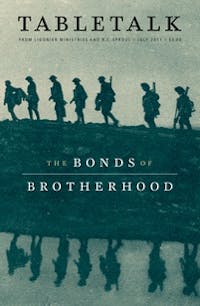
Request your free, three-month trial to Tabletalk magazine. You’ll receive the print issue monthly and gain immediate digital access to decades of archives. This trial is risk-free. No credit card required.
Try Tabletalk NowAlready receive Tabletalk magazine every month?
Verify your email address to gain unlimited access.
It was October 25, 2007, and the moon shone brightly over the rugged terrain of eastern Afghanistan. Elements of 1st Platoon, B Company (173rd Airborne Brigade), walked cautiously back to their outpost after completing their assigned mission. But unknown to them, an unseen enemy waited in ambush. In the three minutes of confusion and chaos that comprised this surprise attack, then Specialist Sal Giunta responded under the intense enemy fire with such courage that he was nominated for, and eventually received, America’s highest award for valor, the Medal of Honor. When asked why he braved incessant machine-gun and small-arms fire during the ambush to charge the enemy alone in search of one of his fellow soldiers, his straightforward reply was, “He would have done the same for me.”
This type of trust and commitment is often mentioned by those who exhibit extraordinary heroism in combat. They risk much with the knowledge that those around them are equally committed. In ways many cannot understand, the success or failure of the U.S. military’s mission rests upon this type of fraternity. It holds teams and platoons together in the face of the sheer terror, or sheer boredom, of war.
This is also the type of fraternity that must exist within our churches if they are going to maintain their witness in the face of the great persecution, or great prosperity, that marks their warfare (Eph. 6:10–20). How do we develop this? As I read news reports about (now) Staff Sergeant Giunta and reflect on my own military service, I can identify three types of activities, all common among military units, that are foundational in building this type of deep-seated trust. While more could be mentioned, think of how these could be tools used to forge greater bonds within your church.
1. Preparation. Responding in the right way to an ambush is not natural — it requires purposeful preparation. Preparing together before the crisis builds trust among the members of a unit. They believe they can undertake challenges together because they see the effort and commitment of those around them. The same is true for churches. The apostle Paul reminds us that we too need training (1 Tim. 4:7). Our natural responses fall short as we do battle against the “sin which clings one who “prowls around like a roaring lion” (1 Peter 5:8). We were not designed to face these enemies alone. Preparing together builds the bond of trust among the members of our churches. This not only helps us develop important skills, it also makes us aware of the level of commitment of our fellow soldiers.
2. Time Together. Why did Staff Sergeant Giunta believe his fellow soldier “would have done the same” for him? Good training? Yes. But he also emphasized the fact that he did not charge the enemy to save a nameless soldier (though, hopefully, he would have). On this occasion, he risked his life for his friend. He did this because they shared a sense of camaraderie that went beyond their formal training.
Spending time together beyond the bounds of formal gatherings also builds camaraderie within our churches. When I was a new platoon leader, I received a surprisingly simple piece of advice for achieving this goal: “Build fires.” Whenever we were in the field and our training was over, we would build a fire for our platoon. I would often sit in the back and just listen as the men gathered around and told stories about their lives. In this relaxed setting, we got to know each other in ways we could not as we trained. So train well, but also find ways to “build fires” and get to know one another in ways you cannot in formal training. This, too, can build trust and strengthen the fraternal nature of the body of Christ.
3. A Culture of Sacrifice. There is a reason that those within the armed forces who exhibit extraordinary heroism do not consider themselves heroes: they live and train within a culture of sacrifice. They are trained to sacrifice the sense of individualism that defines our broader culture. Whether through helping carry the heavy loads of weapons and ammunition of others or sharing one’s last drink of water, putting the needs and safety of others before one’s own is expected and reinforced in countless ways. The ultimate acts of selflessness at which we marvel represent the application of this cultural value in specific circumstances.
In the same way, our willingness to sacrifice in the service of God and one another is directly related to the cultural values reinforced within our churches. The individualism and entitlement mentality of our culture must be offset by the faithful proclamation of the biblical call to self-denial and cross-bearing. Without this, our camaraderie can too easily turn our churches into well-informed and friendly country clubs. We must not only hear this call to sacrifice, we must recognize that we have a role in bearing the burdens of others as we follow our Savior, who “came not to be served, but to serve, and to give his life as a ransom for many” (Matt. 20:28).
